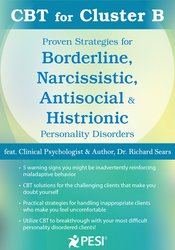

Clients with Cluster B Personality Disorders (Borderline, Antisocial, Histrionic, and Narcissistic) can be amongst the most challenging for therapists. Clinicians who are not properly trained can inadvertently make clients worse, and can even put themselves at risk for licensure board complaints. However, when equipped with a deeper understanding of these disorders and the most effective principles and techniques, it can be extremely rewarding to witness the positive ripple effects that occur in these clients and their families.
Join clinical psychologist and author, Dr. Richard Sears for a compassionate yet direct approach for working with these individuals using cutting edge, practical interventions that are grounded in theory.
In this recording you’ll learn:
With solid principles and detailed case examples, Dr. Sears will bring these concepts and methods to life with passion and humour, giving you practical take-aways to use in your very next therapy session!
| File type | File name | Number of pages | |
|---|---|---|---|
| Manual - CBT for Cluster B (2.5 MB) | 47 Pages | Available after Purchase |

Richard Sears, PsyD, PhD, MBA, ABPP, is a licensed psychologist in Cincinnati, Ohio, board certified in clinical psychology by the American Board of Professional Psychology (ABPP), runs a private psychology and consultation practice, and is the director of the Center for Clinical Mindfulness & Meditation. He has run hundreds of mindfulness groups and was lead clinician in the first brain scan study involving mindfulness with children and adolescents. He is also an adjunct professor in the University of Cincinnati psychology department, clinical research faculty at the UC Center for Integrative Health and Wellness, volunteer professor of psychiatry & behavioral neurosciences at the UC College of Medicine, and a former research/psychologist contractor with the Cincinnati VA Medical Center.
His most recent books include ACT with Anxiety (PESI); The ACT Flip Chart (PESI); Cognitive Behavioral Therapy & Mindfulness Toolbox (PESI); Mindfulness: Living Through Challenges and Enriching Your Life in the Moment (Wiley-Blackwell); Building Competence in Mindfulness-Based Cognitive Therapy (Routledge); and Mindfulness-Based Cognitive Therapy for PTSD (Wiley-Blackwell).
Dr. Sears is a sixth-degree black belt in Ninjutsu, and once served as a personal protection agent for the Dalai Lama with his teacher, Stephen K. Hayes. He has studied Eastern Wisdom for over 40 years, receiving ordination in three traditions, and transmission as a Zen master.
Speaker Disclosures:
What You Need to Know about Cluster B Diagnoses and Approaches
Behaviour – Approach Maladaptive Behavior, Self-Sabotage, Manipulation, and Attention Seeking
Cognitive – Recognize and Interrupt Unhealthy Thinking Patterns
Mindfulness and Acceptance – Breaking Free of Distressing Thoughts, Feelings, and Behaviours
Clinical Considerations for Working with Personality Disorder Clients
Please wait ...